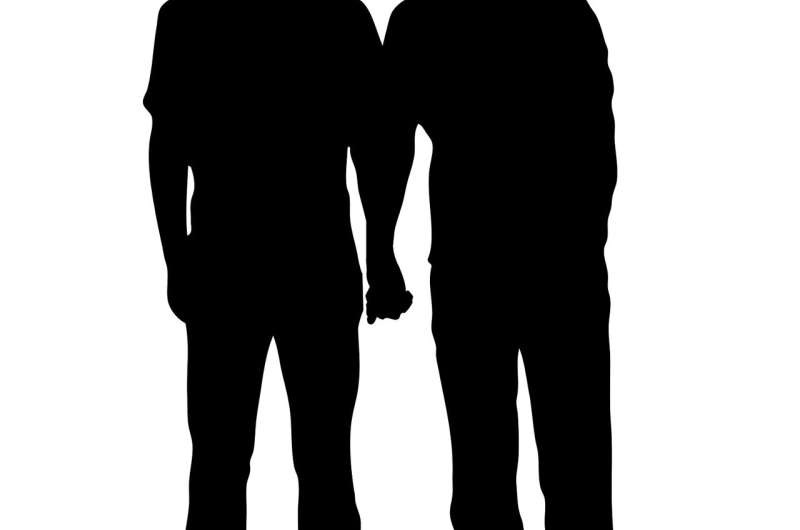This article has been reviewed according to Science X's editorial process and policies. Editors have highlighted the following attributes while ensuring the content's credibility:
fact-checked
peer-reviewed publication
trusted source
proofread
Studies on mobile health intervention suggest positive impact for Black same-gender-loving men

iTHRIVE 365, a mobile health application developed through a collaboration between the Rutgers School of Public Health, THRIVE Social Services (THRIVE SS), Positive Impact Health Centers Georgia and CorporateLounge, a digital development company, creates a space to access HIV/AIDS and psychological health information, community support and resources for culturally affirming health care, housing and other forms of economic support among Black same-gender-loving men.
Black gay, bisexual and other same-gender-loving men experience health inequities that are worsened by high levels of social isolation, low access to effective health care and barriers to economic empowerment. Despite this, health care for Black same-gender-loving men predominantly focuses on individual behavior and risk factors like condomless sex. These approaches fall short of addressing the root causes of health inequities facing Black same-gender-loving men, according to Devin English, an assistant professor at the Rutgers School of Public Health.
The collaboration between community members, social service providers, and researchers developed the mobile app called iTHRIVE 365 that builds upon Black same-gender-loving men community strengths, combats the impacts of oppression and promotes biological, psychological, and behavioral health among Black same-gender-loving men.
In a paper published in the Annals of LGBTQ Public and Population Health, led by English and co-first authors Justin Smith (Positive Impact Health Centers) and Larry Scott-Walker (THRIVE SS) describe the community-collaborative app development process. The manuscript identifies that with iTHRIVE 365, the group aimed to fill a community-identified need of a safe virtual space for THRIVE SS members.
In a follow-up study published in JAIDS, collaborators found iTHRIVE 365 was associated with improvements in daily HIV treatment use and psychological health for these Black same-gender-loving men. This study surveyed 32 Black same-gender-loving men on their experience with iTHRIVE 365.
About 78% of those surveyed reported it was helpful to extremely helpful, 83% reported it was moderately to extremely useful, and 88% reported it was user-friendly and said they would recommend it to others. Researchers also found that participants experienced decreases in depressive symptoms and difficulties with emotion control and increases in HIV treatment usage the day after accessing iTHRIVE 365.
Researchers found that utilization of mobile health technologies may be acceptable and feasible for Black same-gender-loving men, and if aligned with community priorities, may be effective tools for facilitating health equity for Black same-gender-loving men. Mobile health tools and technologies may be effective for Black same-gender-loving men because they provide low-cost and accessible way of reaching members of this group who otherwise may be experiencing practical, social and psychological barriers to in-person health care.
"We illustrate the process of how to develop mHealth technologies in partnership with the communities that will use them and we also demonstrate the efficacy of such an intervention," Justin Smith, a co-author of the study and the director of the Campaign to End AIDS at Positive Impact Health Centers. "We are proud to be able to offer concrete examples to the field of what implementing an equity-centered project can look like in practice."
"We have also demonstrated how using mHealth interventions can help improve the health and well-being of Black same-gender-loving men living with HIV," Smith added. "It is exciting to be able to offer a new tool to serve the health needs of the community that is most disproportionately impacted by HIV in the United States."
Larry Scott Walker, Executive Director of THRIVE SS, said the studies represent "the possibility of eliminating health inequities when community led, collaborative teams work toward a community-identified goal. Our studies reflect that mobile interventions developed by and for Black same-gender-loving men can play a critical role in promoting their daily mental health and HIV care. If we want to support mental health and end the HIV/AIDS epidemic in the United States, our research suggests more community-driven prevention and intervention efforts should be funded."
More information: Devin English et al, iTHRIVE 365: A Community-Led, Multicomponent Health Promotion Intervention for Black Same Gender Loving Men, Annals of LGBTQ Public and Population Health (2023). DOI: 10.1891/LGBTQ-2022-0009
Devin English et al, Feasibility, Acceptability, and Preliminary HIV Care and Psychological Health Effects of iTHRIVE 365 for Black Same Gender Loving Men, JAIDS Journal of Acquired Immune Deficiency Syndromes (2023). DOI: 10.1097/QAI.0000000000003167



















